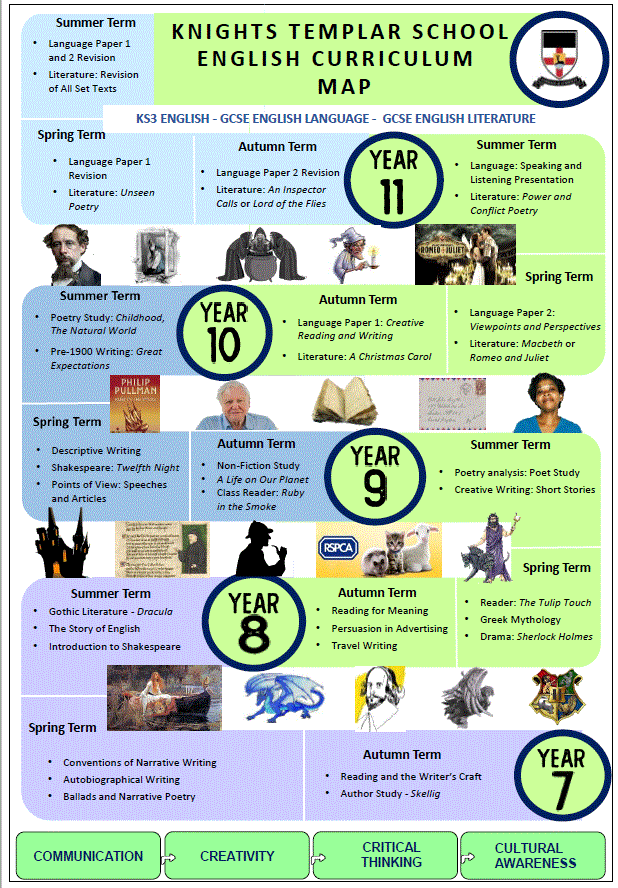Mathematics - Year 7
Click here to return to our English curriculum home page
Below you will find more specific information about the curriculum in English for Year 9 students, explaining to you what students will learn, when, why and how. There is also information about how parents/carers are able to support students in their learning, extra-curricular opportunities in this subject and how it links to other subjects and the wider world.
|
Subject Key Concepts #1 Creativity#2 Critical Thinking#3 Communication#4 Cultural AwarenessPlease click here for Subject Key Concepts. |

Please click here for PDF English Learning Journey |
Curriculum Overview for the year
|
Useful documents:
Please click here for a PDF of curriculum overview.
Please click here for a PDF of Mapping.
While this information covers a broad range of areas, please do get in touch with the Subject Leader Mrs Weston if you have any questions.
Please click on the questions below to find out more.
How are groups organised?
Classes are set according to ability.
Students have 6 one hour lessons per fortnight.
What characteristics does a successful student have in this subject?
The most successful students in English are avid readers and writers who enjoy writing creatively and are able to interpret and analyse the work of writers from a range of backgrounds. They are insightful and can recognise and appreciate the ways in which writers craft their work to create meaning. They are able to use literary devices and linguistic features with confidence within their own writing and appreciate the importance of effective communication in all aspects of life.
How will students learn at this level?
- Reading a wide range of texts
- Reading examples of good creative writing
- Experimenting with different forms of creative writing
- Working collaboratively with texts
- Researching contexts and backgrounds
- Debating and expressing points of view
- Practising written responses and creative writing
How will students’ learning be assessed at this level?
- At the end of each unit you will be given an extended writing task which will be marked against a number of criteria from the reading and writing assessment grids.
- You will be given clear and focused feedback on aspects you are doing well and guidelines on what you can do to improve your work.
- At the end of the year you will sit two examinations testing your ability to write creatively and your reading comprehension skills.
When do key assessments take place?
- End of Units – 2-3 each term
- End of term Writing assessments – last two weeks of each term
- There is no formal exam at the end of Year 8.
How can parents/carers support students’ learning?
- By reading together and showing interest in reading as a leisure activity.
- By encouraging the completion of all homework activities to a good standard.
- By reading all creative writing exercises and responding positively to ideas, offering constructive criticism where appropriate.
What equipment do students need for this subject?
Writing equipment
Reading book
How does this subject link to other subjects?
- Literacy – all subjects
- Analytical skills – most subjects
- Communication skills – all subjects
What websites or resources may be helpful to support students’ learning?
BBC Bitesize for KS3
https://www.nate.org.uk/file/2016/04/The-National-Curriculum-for-English-from-2015.pdf
What extra-curricular or enrichment opportunities are available for students in this subject at this level?
KTS Best Books – write a review for publication on the KTS website
Creative Writing competitions
Film club
What sort of careers can this subject lead to?
- Journalism
- Teaching
- Freelance writing
- Law
- Any career requiring high level literacy skills
What does student work look like in this subject at this level?
Year 9 is designed to serve two purposes: it acts as a transition between Key Stage 3 and GCSE as pupils develop their skills and broaden their knowledge in preparation for GCSE examinations. It is also designed to prepare pupils for the world beyond school, focusing on critical thinking, independent learning and the ability to express ideas clearly and convincingly.
Pupils begin with a comprehensive study of non-fiction in a wide variety of forms; the focus is on analytical skills and critical thinking as pupils respond to what they have read and how writers express their ideas. There is a continued focus on their literary heritage through the study of pre-1900 literature. Pupils study increasingly challenging texts, moving from children’s literature to texts written for adults. They analyse the ways in which writers use language to create meaning and develop an awareness of the importance of the writer’s craft.
Creativity is developed through the study of descriptive writing as pupils are encouraged to become more ambitious in their use of vocabulary and language devices to create engaging and meaningful texts, using a wide range of high quality writing from a range of eras, cultures and genres as a source of inspiration.
Pupils are encouraged to become independent learners through the completion of a Shakespeare project; it is designed to develop research skills and develop critical thinking skills when responding to key themes and ideas within the play. These skills are also developed through the study of poetry and modern drama as students consider the significance of contexts and their responses to the key themes and ideas expressed in literary texts.
Speaking and listening skills are developed throughout Year 9 as pupils are encouraged to work collaboratively, discussing their ideas and responding to the ideas of others. Pupils study speeches and learn to express a point of view aloud, developing their confidence and enabling them to understand the importance of tone, expression and clarity when speaking in formal situations.
Autumn term 1
Non-Fiction Study
Pupils will read a wide range of non-fiction texts, including texts written before 1900, from a variety of genres. They will respond to individual texts to develop reading comprehension skills and will learn to compare texts on similar themes from different time periods and genres. They will consider the importance of the context of a text and reflect on the ideas, attitudes and values expressed within the text.
End of unit assessment task: a structured comparison of two texts from different eras on a similar theme.
Creative Writing: Descriptive Writing
Pupils will build upon the skills learnt in the Year 7 Narrative Writing unit with a focus on planning and writing descriptively. They will study a wide range of descriptive writing and will be taught how to use language features and literary devices for effect. They will learn how to structure their ideas for impact, through careful planning and the use of cohesive devices. They will be expected to write at length and in detail.
End of unit assessment task: a collection of pieces of descriptive writing, each with a different focus; e.g. a place, a character, an event.
Autumn term 2
Author Study
One novel to be studied from: Of Mice and Men, The Woman in Black, Animal Farm, The War of the Worlds.
Pupils will be introduced to challenging literature written for older readers. They will continue to develop their reading skills and their ability to analyse the ways in which writers use language and literary devices to present characters, settings and themes. They will explore complex themes and ideas and will discuss their own responses to key ideas and attitudes. Pupils will research the context of the novel and examine the ways in which contexts have a significant influence on the ideas, attitudes and beliefs expressed by characters and writers.
End of unit assessment task: an evaluative response to a key theme or idea presented in the novel.
Spring term 1
Expressing a Point of View: Articles and Speeches
Pupils will study a number of articles and will learn how to identify both explicit and implicit points of view. They will develop their understanding of how writers use language to communicate views clearly and convincingly and will write their own article, expressing a point of view. They will then study speeches from a variety of sources and will analyse the impact of persuasive language techniques. They will learn how to use them effectively, creating a speech designed for a specific audience and purpose.
End of unit assessment task: an article and a speech written for a specific audience and purpose.
Modern Drama
One play to be studied from: Journey’s End, Our Day Out, Ruckus in the Garden, The Crucible.
Pupils will study a play with complex themes and ideas and will explore the ways in which playwrights create meaning through a combination of language, setting, stage directions and characterisation. They will analyse key scenes in detail and respond to the key themes presented. They will learn how to write analytically about a drama text, responding to it as a performance as well as a written script.
End of unit assessment task: an extended evaluative response to a key scene or theme in the play.
Spring term 2
Pre-1900 Literature Study
Pupils will read and respond to a variety of extracts in order to improve their confidence in reading and develop their understanding of themes, ideas and language use in texts written before 1900. They will consider the significance of context and respond critically to the ideas, values and attitudes reflected within the texts.
End of unit assessment task: a detailed analytical response to one literature extract.
Summer term 1
Poetry Comparison and Unseen Poetry
This unit is designed to embed analytical skills to enable pupils to write perceptively about the ways in which poets use form, structure, language and poetic techniques within their poetry. Pupils will learn to compare the work of different poets, recognising and commenting on the similarities and differences in their use of form, structure and language. They will be taught how to approach an unseen poem, with the aim of increasing their confidence when faced with this element of the GCSE English Literature examination.
End of unit assessment tasks: a comparison of two poems and a response to an unseen poem.
Library Reading Project: Fiction and Non Fiction
To develop pupils’ independent reading skills and promote regular reading and reading for pleasure, pupils will study both fiction and non fiction texts. They will complete a series of activities designed to broaden their experience of reading works of fiction and non-fiction from a range of genres.
End of unit assessment task: short written responses to fiction and non-fiction texts.
Summer term 2
Shakespeare Study and Project
Pupils will study either Twelfth Night or A Midsummer Night’s Dream.
Pupils will be introduced to the play in performance by watching a film or stage production of the text. They will focus on key scenes and will be taught to analyse Shakespeare's use of language, presentation of characters and themes and use of dramatic conventions. Pupils will then be given a Shakespeare play as a focus for their research project. Following clear guidelines, they will complete a study of their play.
End of unit assessment task: completed project on a selected Shakespeare play.
How does this subject support a broad and balanced curriculum, meeting the needs of all students, and developing traditional core skills?
Broad and balanced:
We cover a wide range of literature including pre-1900 texts and texts from other cultures.
We study a range of non-fiction texts, including topics relating to current issues, and encourage critical thinking skills.
Meeting the needs of all students:
We differentiate appropriately in all lessons, adapting unit tasks and all assessments to ensure they are challenging and accessible to all pupils.
Texts are selected according to the ability, strengths and interests of students.
TAs are used effectively to support students and we liaise with relevant agencies/staff to ensure students’ needs are met.
Traditional core skills:
Literacy is at the heart of the English curriculum. We also develop critical thinking skills, encourage the forming and expression of opinion and consider ethics and morality when studying literature in particular.
How does this subject promote creativity, critical thinking, practice, perseverance and resilience, and making links?
Creativity:
We develop thinking skills and encourage students to respond creatively to texts and ideas explored in lessons.
We encourage creative writing throughout the key stage, allowing students the opportunity to think of their own ideas and develop them in the way they wish.
Critical thinking:
We encourage pupils to think about a range of issues, ideas, language use and writers’ intentions throughout the course. They are expected to formulate their own responses and ideas, identifying strengths and weaknesses and expressing their own views clearly and articulately.
Practice, perseverance and resilience:
We encourage drafting and self-editing to enable pupils to identify their own errors and improve the quality of their writing.
We encourage students to complete longer writing tasks on a regular basis to develop writing resilience and read longer, challenging texts and extracts to develop reading resilience. Pupils are encouraged to persevere with challenging tasks and we break down more complex tasks to ensure they are less daunting and more accessible to all students.
Making links:
the subject links with history, geography, ethics and philosophy, art, modern languages, science, through the nature of the texts studied and the ideas explored throughout the course.
How does this subject encourage enrichment and the development of cultural capital, deep learning, and inclusivity?
Enrichment/cultural capital:
We study a range of literary texts from Elizabethan drama to 21st Century novels and poetry.
We introduce pupils to the literary canon including works by Shakespeare and Dickens. We study modern drama, poetry from across the world and non-fiction from a range of writers.
Substance/deep learning:
We study texts written for adult readers as well as children’s literature. Students are encouraged to think about mature ideas and themes and reflect on a range of issues.
All ideas are fully explored and tested to ensure pupils have a thorough knowledge and understanding of the skills taught throughout the year.
Open and inclusive:
We ensure all literature studied is relatable and accessible to all students. The themes reflect a wide number of concerns and issues, which are always dealt with appropriately and with sensitivity. We actively promote inclusivity in all of our units and within our classroom teaching.






